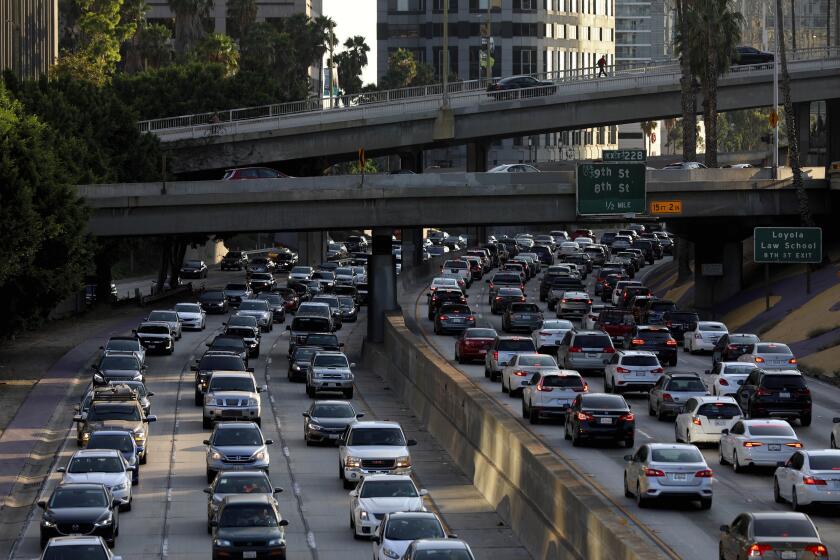Predicting the end of the world wasn’t enough; : now they’re predicting the end of the universe
- Share via
For years I have been collecting a file on the end of the world.
I call it my Doomsday file.
I have reported on this file before but I feel an update is called for. It may be that I have been wasting my time. The latest scientific fad is not predicting the end of the world, but the end of the universe.
That really leaves us nowhere to go. I had little hope that we could escape our planet and take refuge on another one before ours is burned to a cinder or knocked out of orbit by an errant comet or is turned to ice by the death of the sun. But at least there was a chance, if we were clever enough, that somewhere else in the universe we could find a home.
Realistically, I think we are doomed to live and die on our planet. But I suspect that in the time of Copernicus I would have argued that the sun revolved around the Earth, and that in the time of Calvin Coolidge I would have argued that men would never reach the moon.
One of my Doomsday theories is counter-indicated. It is logically pointed out that the Earth will not be reduced to ice by the sun’s extinction because long before it goes out the sun will expand into a bloated mass that will boil the oceans and burn the Earth to a crisp.
So that’s one worry eliminated, if you don’t care for ice.
It will be a long time before the sun collapses and then expands--but we are told that it’s shrinking right now at the rate of four or five miles a year, so it’s going to go out sooner or later.
We also have to worry about the next arrival of a rampant comet of the kind that hit the Earth 60 million years ago, wiping out the dinosaurs, who were blameless. Astronomers are now convinced that these visitors have been impacting the Earth with regularity, and that the next one is due in about 14 million years.
That’s not the day after tomorrow but, still, if one is thinking about human survival, it isn’t long.
Then we have the greenhouse effect. Scientists are worried that the continued release of industrial gases into the atmosphere will not only destroy the ozone layer that protects us from excessive ultraviolet rays, but also raise the Earth’s temperature enough to melt the polar ice caps and flood our coastal cities--such as New York, San Francisco and Los Angeles.
That might not do away with us altogether but it would certainly change our life style. Imagine life without the Big Apple, Frisco or, what the heck, Hollywood.
Meanwhile, the Earth’s spin is slowing. Scientists estimate that 500 million years from now a day will last about 31 hours. Eventually, if this keeps up, the Earth will stop, presenting only one side to the sun, so that we will either burn up or freeze.
If we are really crazy enough to have an atomic war, scientists warn, we will create a nuclear winter--an umbrella of atmospheric dust and debris that will shut out the sun and destroy whatever life has been left.
If we avoid atomic war, we will probably breed ourselves into extinction. A reader, David Simmons, calculates that if we keep doubling our population every 37 years, as we are doing now, in only 230 years the entire land surface of the Earth will have the population density of Manhattan.
Imagine how hard it would be to get a cab, much more get into a decent restaurant.
Now, according to a story in Discover magazine, scientists can’t decide whether the universe will collapse and end in a black crunch or go on expanding, as it has been doing ever since the Big Bang, into eternity.
Either way, you wouldn’t want to invest in it.
If the universe collapses, increasing radiation will turn it bright as the sun, stars will die and the whole ball of wax will vanish in one big black hole.
Says Tony Rothman, author of the article, “A civilization may bury itself underground to avoid the increasingly severe microwave burn, but there’s no escape. . . . No deus ex machina will save (us) from cosmic incineration.”
On the other hand, the universe may not collapse. It may go on expanding into eternity. But there is not a great deal to look forward to in that, either.
In 100 trillion years all the stars will have burned out. Meanwhile, vagabond stars will have pulled the planets out of orbit. Rothman sees a time when “the Earth would probably be wandering lifeless among dead stars and the sun’s corpse would be orbiting in the galactic halo. . . .”
I have greatly simplified the theories but any way you look at it, the future is not promising.
Considering our options, it seems to me that the best thing we can do is to keep on as we are, pour our gases into the atmosphere, destroy the ozone layer, raise the temperature and turn the planet over to flood and ice.
Wouldn’t that be better than ending up in a black hole?
Robert Frost decided, in a memorable poem, that between fire and ice, he thought that ice would suffice.
T. S. Eliot gave us all pause when he questioned whether the world would end with a bang or a whimper.
I suggest that we just go on doing the best we can, and see what happens.






